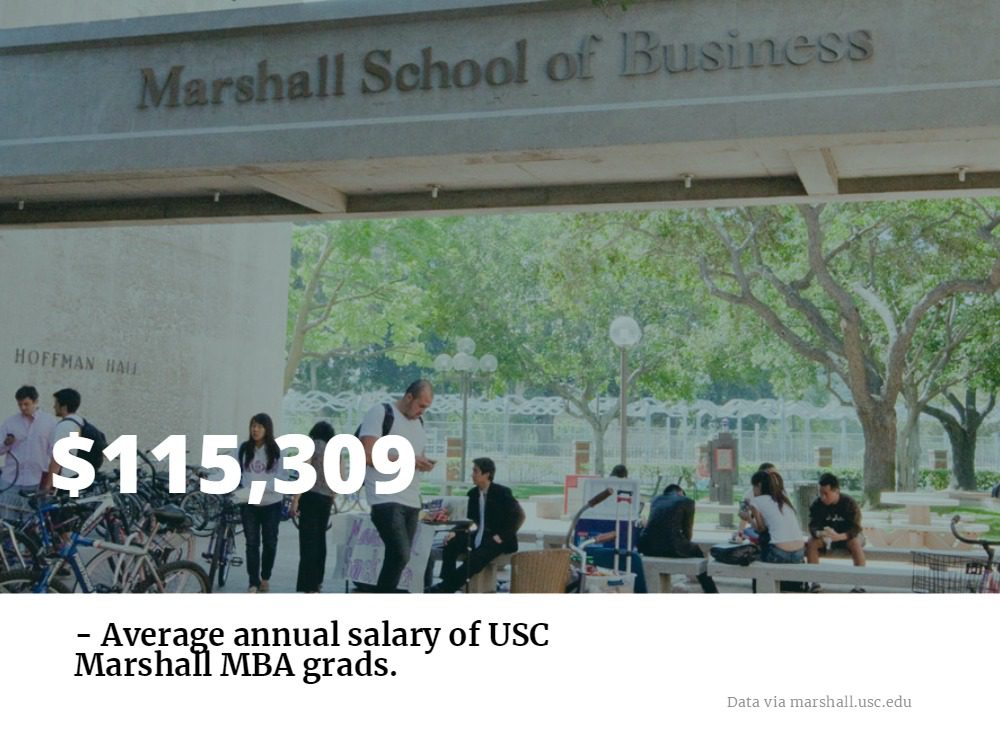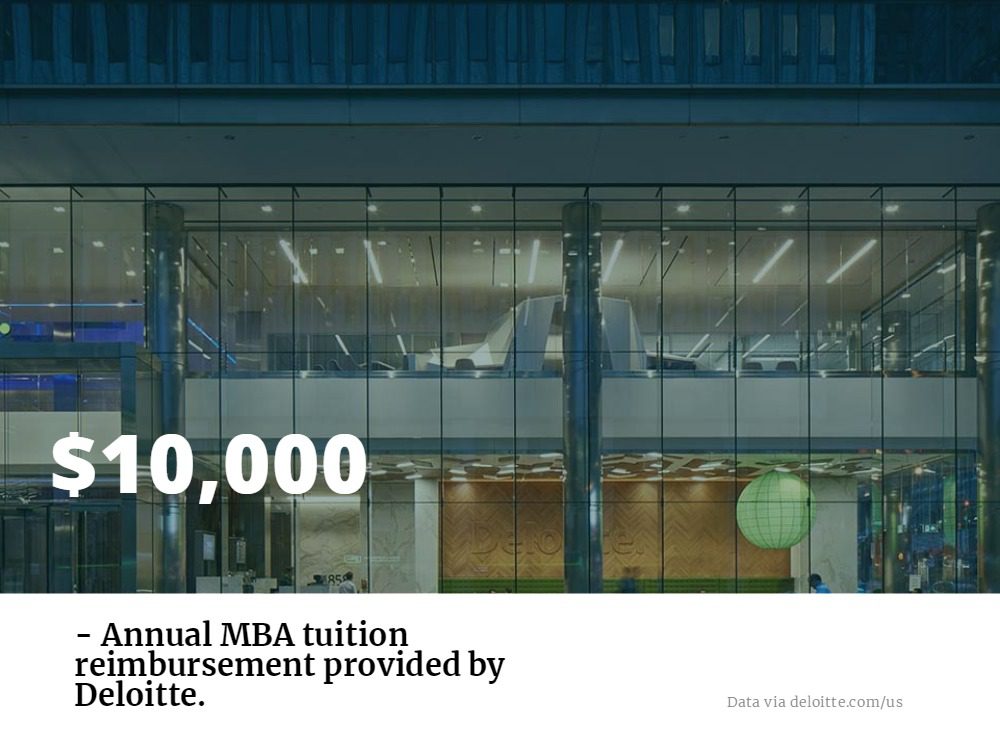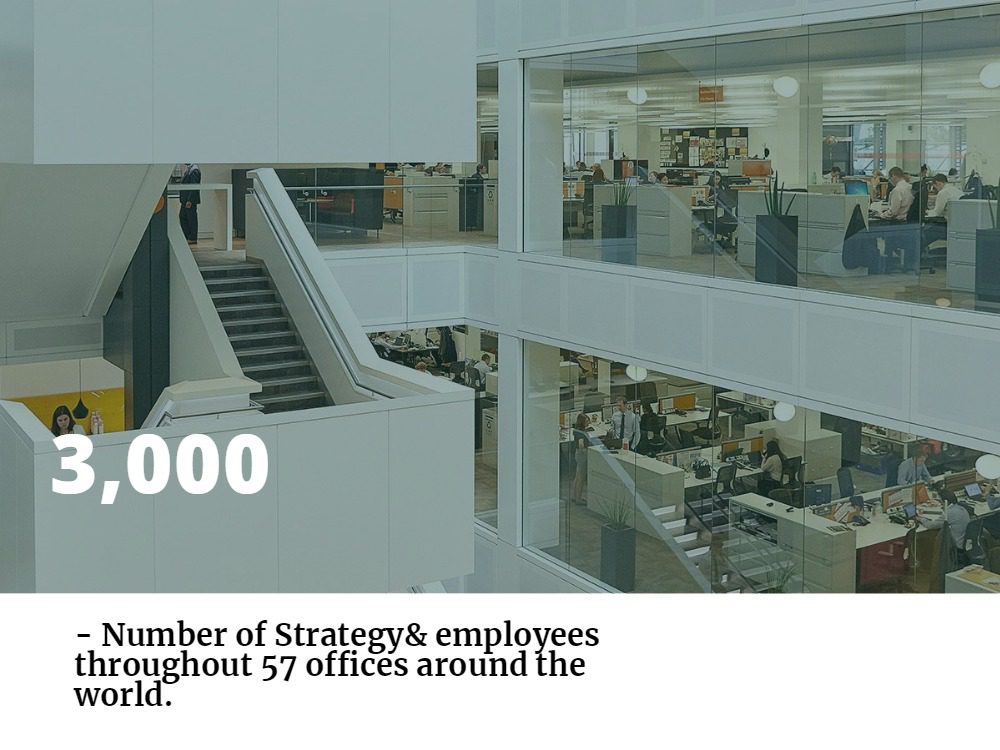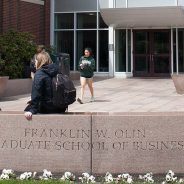Search results for Where Should I Work:
The Value of Choosing a Research-Focused MBA Program at UW Foster
How important is faculty research to choosing your MBA program? Should you care if you go to a research university or is it all just white smoke? Is there value in choosing a research-focused MBA program?
We know that faculty matter. According to a paper written by researchers at Indiana University and Michigan State University titled “Faculty Do Matter: The Role of College Faculty in Student Learning and Engagement,” faculty have a significant impact on student learning and the overall educational experience.
“The impact that a faculty member can have on the student experience can be seen in and out of the classroom,” the study explained. “We found that faculty behaviors and attitudes affect students profoundly, which suggests that faculty members may play the single-most important role in student learning.”
But what about faculty research, is it important? Continue reading…
Babson Reveals New Scholarships, Rankings, for Blended Learning MBA
What if you could earn your MBA with minimal time in the classroom? That’s precisely what the Blended Learning MBA program at Babson College’s F.W. Olin Graduate School of Business offers. It’s a unique MBA program that combines online classes with face-to-face instruction to provide students with flexible scheduling and the ability to continue working full-time. Continue reading…
How To Begin Your MBA Search, Pt. 3: Recognizing the Best Resources
You can find the first and second installments of our ongoing “How To Begin Your MBA Search” here.
So, you’ve narrowed down the list of business schools to which you’re applying, keeping in mind location, student body make-up, potential networking opportunities, the return on investment, and your professional goals. But while there are an additional host of ineffable qualities that guide a prospective MBA to one program or another, you must also keep in mind the resources of the programs that make up your short list. The importance of these resources will certainly depend upon your own subjective needs, but most potential MBAs will find it necessary to consider the following factors before making decisions on program choices.
Money, Money, Money
Suffice to say, business school is not cheap. Tuition at some programs can soar north of $60,000 USD per year, and unless you are currently working and your employer is chipping in, you will probably worry about how you will pay for school (particularly if you’re out of the workforce). Thus, sussing out which schools provide merit, and finding need-based scholarships is a good method of finding which schools might make the top of your list. And while a significant return on investment is almost guaranteed with an MBA, it goes without saying that graduating with less debt is preferable to graduating saddled with loads of it. Luckily, according to U.S. News & World Report, many more schools are offering such financial assistance, so if you do your research and get busy applying for fellowships and awards, you might be able to lighten the dreaded b-school burden!
I Went Looking for a Job and Then I Found a Job
Hillary Schubach of Shine MBA Admissions Consulting says that potential b-school applicants should ask, “Are there campus resources, student organizations, and activities that align with your interests?” As discussed in the second part of our series on starting the MBA search, while building a network is important, a b-school’s career services resources are also well worth researching. Where are alumni placed? Does the career services office seem robust and well-staffed, and are the advisors in-house or outsourced? These should be pertinent questions to you and any future MBA.
Know Who You’ll Be Learning From
Finally, before settling on any program, identify the professors whom you’ll most likely be learning from, and maybe try to find out more about their teaching style. Stacy Blackman of Stacy Blackman Consulting suggests asking, “what teaching methods appeal to you? Are there particular teachers, courses, fields of study or extracurriculars that appeal to you at certain schools?”
While some of these questions might have been answered when you asked yourself questions regarding where you want to end up after graduation, it is worth reiterating that if you’re unable to learn in certain environments or within certain teaching styles, you won’t be able to achieve your goals as smoothly.
Schubach gives the following advice :
“Core classes and electives that fit your career goals are extremely important. Do your needs align with the academic strengths of the school? Are you looking for a general management program, or one where you can select a concentration in your target field?”
In other words, it isn’t just the professors, but the structure of the program itself that is worth looking at closely— are the core classes suitable to your end goals? Do you need more or less structure in an academic setting?
While it seems like there are an infinite number of factors to weigh when finding the right MBA program, remember that on graduation day, you will want to look back on your b-school experience as one that was well worth it, which makes the questions all the more necessary.
Inside the Relaunch of the Berkeley Entrepreneurship Association
Entrepreneurship at the Haas School of Business at UC Berkeley is getting an upgrade. Right now the university is working to rebrand and relaunch the Berkeley Entrepreneurship Association (BEA). While the newly updated BEA isn’t available yet, it’s in the works and will have many exciting announcements over the next weeks and months.
We were lucky enough to get an inside look at what’s coming to the BEA in a talk with Luca Cosentino, MBA’19, the President and Co-Chair of the BEA and the man behind the re-launch. Here’s the inside scoop!
MetroMBA: What is the Berkeley Entrepreneurship Association (BEA)?
Luca Cosentino: The Berkeley Entrepreneurship Association is meant to be the one-stop shop for entrepreneurship at Berkeley. Ideally, everything that happens around entrepreneurship should be coordinated or monitored by the BEA. It’s not just for business school, but also for students across the campus. It’s the umbrella under which all entrepreneurship initiatives, partners, mentors, funding, and resources will rest.
The BEA has been at Berkeley for a while as a collaborative effort, and it did a great job before, but we are adding to it. Prior to this relaunch, the BEA focused on one-off events and bringing founders to school. They did a great job regarding inspiring people to entrepreneurship. We want to keep doing what they did—the education side—but add the practical side. In this sense, the innovation is massive.
We are rebranding BEA. We are moving from one-off events to something that the potential to be around for twenty years and could be translated into a core university program matching what the University currently offers on entrepreneurship.
The one thing I want to underline is that is that every university has entrepreneurship programs where you’re matched with other people, but the value here is that we’re connecting people from different schools around the community of entrepreneurship. We are working to build the entrepreneurial community at Berkeley. The value of this community is that it won’t be agnostic to one specific initiative but will serve as an umbrella for all.
MM: Why is the BEA important and what is its goal?
LC: Before getting started with BEA, I spoke to a number of people from different business schools around the country. I wanted to know how each school dealt with entrepreneurship and how it was defined. What I noticed was that there were a bunch of great resources for helping students understand what entrepreneurship is, but it was really hard to find programs that helped students move from zero to one—from a basic idea to “Okay, let me try.” Students have access to many great initiatives where they can brainstorm and talk about their ideas, but to move from an idea to start effectively doing something around that idea is a completely different story.
We believe that if we give business students all the weapons and tools they need to start working from day zero, it’s going to have a massive impact on everyone’s career.
We also noticed that, too often, schools separate skills. For example, the computer science department is separated from the data scientist group and the information group. But we all know that entrepreneurship, great ideas, and great companies come from different skill sets, backgrounds, and diverse teams. We want to encourage that.
A student’s life is busy. Their schedule is packed, so going out and finding people that you like and that you want to work with that are aligned with your ideas is pretty difficult. We want to make this process faster. We believe that this is a great value we’re going to bring to students.
The application of the BEA is very big and far-reaching. There’s a strong impact on entrepreneurship itself, but also for employers and students. We all know that employers are keener to hire people from an entrepreneurial background. There’s a definite advantage for companies who bring on employees who have gone through capitalist discovery, testing, etc. This program really offers 360 degrees of benefits.
CA: What will the BEA offer?
MM: As an organization, we have a few missions starting this year and moving into next year.
-
Encourage Entrepreneurship
Our first mission is to encourage people to start companies. When you think about the typical MBA student who takes two years off to come to school and study, their main goal is to gain more experience and skills. Many MBA students also come to business school because they want to do something different, or possibly, follow their passions. But, when it comes to business school, entrepreneurship, generally, has a less relevant place compared to companies who offer internships or full-time positions. What we’re trying to do is encourage students to start companies and give entrepreneurship a try.
-
Create Entrepreneurial Collaboration
The main innovation that I’m most excited about and what we’re working hard to start in the fall is a program that connects students and individuals from across different schools and different backgrounds. For the first time in Berkley’s history, it will be an initiative led by students and coordinated across different schools. I believe it will be the largest program ever created at Berkeley connecting technical and business students, student clubs, VCs, mentors, funding sources, and institutions.
The goal of the program is to take great ideas and start them along the process, through customer discovery to business model evaluation. The steps are as follows:
- First, the program will allow people to present their innovative ideas.
- From there, the BEA would match the idea to a team of three or four people with different interests.
- Then, over three to four months, that team would work together to gather every resource they need to transform the idea into a workable concept company.
Currently, the program name has not been announced, but it will be released in a few weeks. For now, everything has already been put in place, and Berkeley is ready to launch their first cycle in Fall 2018.
-
Connect the Entire Entrepreneurial Community
The next focus for the BEA is to connect students with startups. There are many students and MBAs who are not 100 percent keen to start their own company but are curious about what it’s like. Our goal is to offer them a part-time experience, while in school, that offers them a unique chance to test their skills in a start-up environment.
Part of this focus will also be to connect the startup ecosystem at Berkeley. That means connecting startups, accelerators, VCs, etc. Already, we have collaborations with many different communities including:
- Participating Clubs: Computer Science Undergrad Association (CSUA), Computer Science Graduate Association (CSGSA), FemTech, Mobile Developers at Berkeley, Data Science Society, Upsilon Pi Epsilon Computer Science Honor Society, and many more coming.
- Collaborations: Xoogler community (community of ex-Googlers), Google Launchpad, Startup Grind, Dorm Fund, Sutardja Center for Entrepreneurship, SkyDeck Startup Squad, Citris Foundry, Food Club, and more.
-
Entrepreneurial Education
Finally, the last thing we’re launching is an educational program that will include courses, a new website, a new blog, and a new podcast (all launching soon) that will include information from entrepreneurs, venture capitalist, product managers, blockchain, and more.
Other educational programs that we will be launching include:
- A cross-schools educational event that we hope will help bridge the cultural gap between students in different schools.
- Life as an Entrepreneur: a seven-week class with a variety of speakers including founders, VCs, etc.
- Educational events around hot technical topics.
Currently, the Berkeley Entrepreneurship Association is still in its early relaunch phase. The newly updated website will be up in the next few weeks so check back on the school website and the Berkeley Haas Entrepreneurship Program regularly to catch its launch.
The Best Long Angeles MBA Return on Investment Bets
Return on Investment (ROI) is one of the most important factors a prospective MBA can take into consideration when choosing the right business school.
Of course, the true value of each MBA program may ultimately be something impossible to measure. The kind of connections made through professional networking, the soft skills that students attain which help them navigate through both their personal and professional life—these aren’t things that can be easily quantified. But, thankfully, factors like average salary increase, rate of post-graduate employment and the overall tuition of a program are. And these numbers can help students start to better see an overall picture of what each MBA is worth.
The Best Long Angeles MBA Return on Investment
The Marshall School of Business – USC
The Marshall School of Business at the University of Southern California is consistently one of the top ranked MBA programs in the state of California and even throughout the country. Specific ROI aside, these sorts of honors should also be a factor when considering the overall value of the program: for example, Marshall has been named the third best program for “Most Satisfied Business School Graduates” by Forbes and sixth on The Economist’s ranking of “Best Alumni Networks.”
Based on tuition for the 2017-18 school year, the total expense (tuition, fees and living expenses included) to pursue a full-time MBA at Marshall would be $95,881 for the first year and $82,522 for the second, for a total of $178,403.
Now take into consideration the fact that the average salary for graduates of Marshall’s full-time MBA program within three months of graduation is $115,309, and that the large majority of job offers (38 percent) for MBA students came from on-campus recruiting or job postings through the university. The second highest source of employment (21 percent) came from internships held while in the MBA program. Furthermore, a number of top organizations—such as Apple, AT&T, and Walt Disney Studios—hired the graduates of Marshall’s 2016 MBA class. All of these factors boost the overall ROI of Marshall’s program, making it one of the top valued programs in L.A.—even with the high price tag.

Anderson School of Management – UCLA
The Anderson School of Management at UCLA is another program which offers a high ROI when considering the types of opportunities and salaries available to students after graduation. While the tuition cost is certainly high—roughly $194,220 (including fees and living expenses) for the the two years of the program, the benefits to students are undeniable.
A look at the full-time employment report for the most recent MBA class finds that 92.4 percent of students were offered full-time employment within just three months of graduation, with 87.7 percent acceptances. By far (72.2 percent) , students found their employment opportunities through Anderson-facilitated resources, such as internships, on-campus recruiting, or from UCLA Anderson alumni and classmates.
The salaries for graduating Anderson students also reveals a positive trend: the average post-graduate compensation was $118,150, with 70.6 percent of students earning signing bonuses of up to $89,500. The connections sewn by Anderson internships and alumnae also reveal a significant payoff in the types of organizations hiring Anderson alum: companies like NBC Universal, IBM, Barclays, Google, and other major corporations now have Anderson MBA graduates on staff.
The Paul Merage School of Business – University of California, Irvine
The UC Irvine Paul Merage School of Business is one of the top business schools in the Los Angeles metro area, as evidenced by its consistently high rankings from various publications, such as the Financial Times and U.S. News & World Report.
With the program’s recognition for its high lifetime earnings combined with the relatively low cost the degree, it’s no surprise that that the program at UC Irvine produces a high return on investment. The estimated total annual cost of an MBA at Merage ranges from $67,422—$83,967, depending on if you whether or not you are a resident of California and whether or not you will be using campus. This is compared with an average post-graduate salary of $97,808 for the 2017 graduating class. About 50 percent of all students were employed by graduation, and 81 percent held full-time jobs within three months.
Graziado School of Business and Management – Pepperdine University
One of the reasons Pepperdine’s Graziado School of Business boasts such a high return on investment is the many different formats in which students can pursue a full-time degree. With the opportunity to take the full-time MBA over the course of 12, 15, or 20 months, the Graziado MBA typically costs less overall ($74,250 for the 12-month program, $99,000 for all others) and means less time away from a full-time paycheck.
Combine this with the success rate of 82 percent of students accepting job within three months after graduation and a $120,000 starting salary (at highest), and its understandable why Graziado graduates find incredible value in their degree.
Here Are The 7 Hardest MBA Admissions Interview Questions
Clear Admit recently explored seven of the hardest MBA interview questions you may encounter, with helpful tips on how to handle them.
We recently shared our list of the most commonly asked MBA admissions interview questions, along with extensive advice on how to approach such queries. In light of the popularity of that piece, we’ve decided to up the ante this time around and spend some time deconstructing the absolute worst, totally unfair, just all-around-tough MBA admissions interview questions.
How did we do this, you ask? We called on three members of our team—all of whom have significant admissions experience at top schools—to comb through our extensive Clear Admit MBA interview archive and hand pick a set of particularly challenging questions. The only ground rule was that they needed to be questions posed to applicants with some degree of regularity, as opposed to one-off, oddball questions from an ‘off the reservation’ alum.
Arriving readily enough at a set of incredibly tough questions, our team of former admissions officers then crafted extensive guidelines on how to approach each one.
WARNING: Some questions on the list appear very sweet and innocent. Be aware that looks can be deceiving.
If you’re preparing for an upcoming interview, you won’t want to miss this valuable insider advice. It can help make answering even the most challenging questions feel like a walk in the park.
The Seven Hardest MBA Admissions Interview Questions
1. Describe a failure in which you were involved.
Why It’s Tough
Most candidates, when preparing for an interview, focus on the positive aspects of their story. They cannot wait to share their successes and highlight their strengths. So when asked directly to describe a failure, they can be unnerved at best and completely thrown at worst, especially if they haven’t given such a question any thought.
Key Considerations
The type of failure, the time frame of the failure and what you learned as a result will all be relevant in terms of addressing the question.
Risks:
- Picking a failure that is really just a veiled success story, i.e. not a real failure. “We missed one deadline (failure) but we shipped an outstanding product (success).” This type of answer can be perceived as avoiding the question.
- Picking a failure that is so substantial, and recent, that the interviewer genuinely worries that you might make the very same type of mistake again—either due to incompetence or because you just simply haven’t had time to learn from it yet.
Planning Your Response
Make sure you prepare to address a real failure that you played a part in and acknowledge your direct role. While the failure should be substantial, it should not be catastrophic to an organization. Address the process you went through in terms of deconstructing the failure and how you have learned from the experience. Finally, discuss a more recent success that demonstrates your use of the lessons learned from the earlier failure.
2. What other schools are you applying to?
Why It’s Tough
Many professionals in the admissions community feel that this question is simply unfair. There are several reasons for this, one of which is that applicants don’t really know how the answer is going to be used (more on this below). In addition, it’s not as though candidates are allowed to ask their interviewer about the other applicants the committee is considering…
Key Considerations
Fair or unfair, let’s unpack the purpose of the question a bit: Is it to determine your likelihood of attending the program you are interviewing for? Is it to assess whether you are ambitious in terms of school selection or more conservative? Is it simply to see if your list of target schools makes sense and demonstrates a thoughtful approach on your part? Any or all of these options are possible depending on the school interviewing you.
In most instances where this question is used, it is being asked by schools that are concerned about their yield. They want to avoid admitting candidates that clearly will select another school when given the choice. That being said, there are admissions interviewers who ask this question merely to better understand your approach to selecting target schools—and to determine whether you are simply applying to schools ranked in the top 10 or have a more nuanced approach. Regardless, you should prepare a solid answer.
Planning Your Response
There are three parts to addressing the question. First, you do want to be honest even if the question feels unfair. Second, as you list your schools, explain why you chose them. You want to demonstrate that your selections are thoughtful ones resulting from thorough research and careful consideration of your career plan, preferred teaching methods, campus environment, etc. Finally, should make the case for why the school you are interviewing with is a very excellent choice among the group of schools you’ve listed—citing specific elements of the program that fit well with the criteria that drove your overall school selection.
3. Describe a conflict at work and your role in it.
Why It’s Tough
It can be hard to discuss conflict without taking sides or painting some of your colleagues (or yourself) in a negative light. It can also be dangerous to highlight a conflict and appear detached from it—e.g. downplaying your role—because that could suggest either that you did nothing to stop it or that you simply aren’t important enough at work to have played a role/taken a side. In short, this kind of question is loaded with “damned if you do, damned if you don’t” issues.
Key Considerations
A common question in an MBA interview will look at how you handle conflict, and usually conflict at work. Schools ask this question to test your emotional intelligence and to see how you talk about your peers, your bosses, your organization, etc. Even the slightest whiff of “throwing someone under the bus” can backfire. It’s also important to showcase your ability to see the various sides of a conflict.
Preparing Your Response
It makes sense to prepare a particular conflict you have had at work and be ready to use the example. A strong response to this question needs to show your role in the conflict, who it was with, how it was addressed (if, in fact, it was addressed) and what the result was. Equally as important will be to share what you learned from the experience and how a subsequent situation at work was resolved positively or avoided altogether as a result of what you learned.
Interview with John Gilligan: The New Director of the Oxford Saïd Finance Lab
Are you looking to dive deep into finance during your MBA program with the opportunity to interact with banking firms, funds, and industry leaders? That’s the theory behind the Finance Lab at the University of Oxford’s Saïd Business School. Continue reading…
Philly News: UD Promotes Gender Equity and More
Let’s visit some of the biggest news coming out of Philadelphia business schools this week.
LeBow Students Help Dow Chemical Use Customer Feedback—Technical.ly Philly
Teams of students and faculty at Drexel University’s LeBow College of Business are on a mission to help companies utilize massive amounts of untapped data. Recently, LeBow students have been helping university partner Dow Chemical in a quest to glean insight into consumers’ responses to products.
According to the project’s supervisor, Professor of MiS Murugan Anandarajan, “Our students not only extract, clean and explore data—they also derive valuable insights that can be used to make decisions. Students transform data points to convey potential strategies that companies should implement.”
Using online reviews of Dow products, students created an interactive dashboard to map out patterns in reviews. With an accessible map of this data, the company can easily use trends in consumer feedback to improve its products and marketing.
Read more about LeBow’s work with Dow Chemical here.
Lerner College to Host Women’s Leadership Initiative Launch—Delaware Business Now
The World Economic Forum predicts that it will take 158 years to reach true gender equality in North America alone. Luckily, schools like University of Delaware’s Alfred Lerner College of Business and Economics are committed to promoting gender equity now. In fact, this International Women’s Day, Lerner is hosting the Women’s Leadership Initiative Launch at the Roselle Center for the Arts.
According to UD’s website, the Women’s Leadership Initiative (WLI), “… is the preeminent driver of learning to propel transformational women leaders and advance gender equity in the workplace.”
The free event at the Roselle Center will feature prominent alumni speakers like Terri Kelly, president and CEO of W.L. Gore and Associates, Inc., Mary Ellen Payne, former VP of sales and marketing at Verizon Communications, and several others.
Read more about the Women’s Leadership Initiative Launch here.
Wharton Professor Claims Brainstorming Meetings Stifle Creativity—CNBC
In a recent interview with Amazon, Adam Grant, famed author and professor at The Wharton School at University of Pennsylvania, detailed the flaws with using brainstorming meetings to find creative solutions. According to Grant, bringing colleagues together to think out loud is a surefire way to limit the scope of their ideas. Shyer or less assertive members of the team may go unheard, fear of embarrassment may make others “play it safe” by expressing only their most conventional ideas, or the members of the group may fall into convergent thinking, wherein the majority of people support one idea and less popular suggestions fizzle out.
Grant promotes having everyone write out their ideas before sharing them. In fact, Grant says that the way to reach maximum creativity is to write out 200 ideas. Grant, organizational psychologist, has authored several books and was recently named to Fortune’s 40 Under 40 list.
Read more about Adam Grants views of creativity in business here, and check out the Amazon video below.
Drexel Study Confirms Sitting Is Hurting You, Your Employer
Sitting has gotten some bad press in recent years. The negative health effects of sitting for long periods and sedentary lifestyle in general are so severe, some are even referring to sitting as “the new smoking.” A sobering study in Annals of Internal Medicine linked sitting for over 90 minutes at a time with nearly a 200 percent greater risk of early death. Moreover, The Washington Post associated hunching over a computer for extended stretches of time with organ damage, muscle degeneration, leg disorders, foggy brain, strained neck, and serious back issues. In 2012, the British Psychological Society (BPS) estimated that in a typical workweek, people spend about 5 hours and 41 minutes per day sitting, more than enough time to take a serious toll on employees’ health.
Natalie Pedersen, JD, professor at the Drexel University’s LeBow College of Business, and Lisa Eisenberg, JD, Kline School of Law alumna, coauthored a paper in which they assert that employers should be held liable for health issues their employees experience as a result of a sedentary lifestyle.
Pedersen told WorkersCompensation.com that, “What we were trying to figure out was if there were certain instances where an employer would be liable for those kinds of workers’ compensation claims that might arise from a more sedentary work life. It’s definitely sort of a newer theory.” Pedersen went on to say that as the health risks associated with a sedentary job gain more recognition, “… I think we’ll see more of this sort of liability.”
The paper, “If Sitting is the New Smoking, What Does This Mean for Employers? A Look at Potential Worker’s Compensation Claims in the Sedentary Workplace,” which the coauthors wrote for the Lewis & Clark Law Review, analyzed workers’ compensation claims surrounding sedentary workplaces throughout the US.
Solutions to the sedentary workplace problem, like incentives for employee fitness, standing desks, and breaks built in to the work day are becoming more commonplace. Holding employers legally accountable for the health of their employees in environments with prolonged sitting could lead to a dramatic decrease in premature death and aging.
Real Humans of the NYU Stern MBA Class of 2019
Clear Admit recently profiled many of the standout students from the NYU Stern MBA Class of 2019, which you can read below.
New York University’s Stern School of Business got the party started this summer as the first leading business school to share a profile for its incoming Class of 2019. That profile, published in late July, revealed a 4 percent uptick in application volume over the prior year. At the same time, the school admitted significantly fewer students—822 this year as compared to 871 last year—which means that those who got in did so against greater odds.

This increased selectivity may have contributed to the rising GMAT scores among those who got the nod. Both average and median GMAT scores increased year over year. The average GMAT score jumped six points, from 710 to 714. The median score increased even more significantly, from 710 to 720. Average GPA, though, slipped slightly, from 3.51 to 3.48.
As the school’s admissions process grew more selective, the enrolled class grew more diverse. The incoming class is 38 percent female, up from 35 percent the prior year. International students also increased to represent 37 percent of the Class of 2019, up from 35 percent in the Class of 2018.
In terms of the work experience they bring with them, more members of the Class of 2019 come from the financial services industry (29 percent) than any other. Another 12 percent of the class came from consulting. Students with government/non-profit, tech, and military backgrounds followed, at 7 percent each.
While some of these statistics hint at both the diversity and the high caliber of the incoming class, nothing brings that to life more than a look at some of the real students who enrolled. We spoke with five of them—drawn from Massachusetts, Texas, Michigan, India, and Lebanon respectively—to learn more about why they chose Stern, how they hope the Stern MBA will help them transform their careers, what advice they would offer to applicants navigating the admissions process right now, and more.
Perhaps not surprising, NYU Stern’s New York City location factored highly into the decision-making process for many of the students we asked. But so too did its community—including how approachable and friendly current students were to prospective students and the school-wide emphasis on IQ + EQ (emotional quotient)—and its curriculum, which has a strong core but also gives students the opportunity to explore electives early on and offers specializations in things like luxury marketing and technology. The reach of its alumni base was also a factor cited by several of the students we spoke with.
Read on to learn more about some standout members of the NYU Stern MBA Class of 2019.
How Can You Earn a Career at Deloitte?
In 2017, Deloitte placed 11th out of “Fortune’s 100 Best Companies” to work for. It achieved its top slot thanks to the company’s focus on work/life balance where “you decide how fast paced/slow paced you want to take it.” In fact, 91 percent of Deloitte employees say their workplace is great with:
- Great challenges (96 percent)
- Great atmosphere (95 percent)
- Great rewards (94 percent)
- Great pride (97 percent)
- Great communication (95 percent)
- Great bosses (94 percent)
So, it’s no wonder that Deloitte is a top career choice for many MBA students. The company fits the 33 percent of 2016 post-graduate MBAs who want to work in consulting according to the 2017 Prospective Student Survey conducted by the Graduate Management Admissions Council (GMAC). And Deloitte also falls into the Big Four—KPMG, EY, PwC, and Deloitte—a prestigious place to be.
In addition, Deloitte is a major MBA recruiter with a depth of different career opportunities including Strategy & Operations, not just consulting. According to Transparent Career—a GlassDoor for MBA students—Deloitte ranks as the seventh best consulting company to work for with a composite score of 81/100.
Why You Should Consider Deloitte
So, why should you consider Deloitte as your next career move?
- Culture: For 18 years, Deloitte has been on Fortune’s “100 Best Companies to Work For” list. That indicates consistency.
- Giving Back: Deloitte supports more than 5,000 nonprofits each year through its workplace giving program. Plus, workers gave more than 440,000 volunteer hours in 2016.
- Inclusion: Approximately 2/3 of Deloitte’s new hires were women and minorities, and DiversityInc ranks it as one of the “Top 50 Companies for Diversity” and has done so for 13 years.
Deloitte also pays very well. In fact, according to a recent Business Insider article, Deloitte is ranked as the fifth best paying consulting firm for MBAs. Deloitte Consultants can expect a total compensation package of $221,250. The break down is as follows:
- $25,000 signing bonus
- $149,000 base salary
- $2,500 relocation local or $10,000 relocation out-of-state
- Up to $37,250 in performance bonuses
As for what working at Deloitte is like, according to efinancialcareers, “People say they love working for Deloitte because of its ‘dedicated workforce, dynamic and exciting work environment [with] opportunities for professional growth and advancement,’ as well as its ‘flexibility and mobility’ and ‘interesting assignments.’”

And one current employee described Deloitte as “invested in learning and development” saying that “partners and directors are very approachable” while coworkers are “well-educated and professional.”
Life at Deloitte
What’s a day in the life of a Deloitte new hire look like? It depends on where you work. Deloitte isn’t just a consulting company. MBAs can work in a variety of industries including banking, energy, national defense, real estate, and entertainment and in a variety of functions from mergers and acquisitions to audit and assurance, tax, and financial advisory.
Your career path at Deloitte will depend on where you’re hired. If you’re thinking of a career in management consulting, then joining the Strategy & Operations program as a Business Analyst is a smart move. As an MBA, you’ll start at the senior consultant level for two to three years. From there, you’ll move to manager for three to six years, senior manager for 406 years, and then finally reach principal/director. Within this career path, you’ll help market-leading client organizations tackle their complex business programs to drive results. You’ll be exposed to a variety of industries, clients, and projects.
There are quite a few other options as well. You can join Deloitte as a:
- Senior Consulting in Technology, where you’ll make strategic decisions where technology intersects with business strategy. In this position, you’ll use technology to help companies grow and evolve.
- Human Capital Consultant, where you’ll help clients develop solutions across their enterprise looking beyond human resources.
- Audit Staff Assistant, where you’ll work with a team to navigate the difficult landscape of auditing first-hand.
Depending on your previous experience, MBAs at Deloitte can work in one of eight divisions:
- Audit
- Consulting
- Financial Advisory
- Internal Client Services
- Real Estate
- Risk
- Tax Consulting
- Technology
Landing a Deloitte Career
Landing a job at Deloitte starts with their Deloitte Consulting Immersion Program, Client Service Internship, and various competitions. In each of these programs, MBA students will have the opportunity to interact with higher-ups at Deloitte who are responsible for hiring.
During the internship, MBA students will spend eight to ten weeks working in one of four business functions: risk and financial advisory, audit and assurance, consulting, and tax. On the other hand, the Immersion Program is just three days in length but provides MBAs with the opportunity to evaluate the depth, breadth, and quality of the job opportunities at Deloitte. As for the competitions, the National Case Competition and the National Consulting Case Competition are held at Deloitte University each year—inviting top students from MBA programs around the world.
Still, landing a job at Deloitte isn’t easy. Heidi Soltis-Berner, the Managing Director for talent at Deloitte, told efinancialcareers:
“We’re always looking for the best talent, and we’re pretty selective in who we hire. Overall, our applications were very similar to last year—we got around 500,000, and in the fiscal year 2016 we hired approximately 18,000 individuals, about 50 percent to 60 percent were from a campus setting, which equates to about a 4 percent hiring rate, pretty close to what it was last year.”
Specifically, at the graduate level, Deloitte added 6,400 new hires in 2016—most of those post-internship. According to the Deloitte website, qualified MBA candidates looking to earn a Senior Consultant position should have:
- 3-5 years work experience (preferably in a large company)
- A high level of personal and professional experience and history
- Superior analytical skills
- Willingness to travel
- Leadership capabilities and solid teamwork skills
- Exceptional communication and interpersonal skills
School v. School: Harvard Business School or MIT Sloan?
When selecting an MBA program, it can be difficult to cut through the fog to make the best long-term decision. For elite schools, the veil of prestige casts a long shadow. For lesser-known schools, it’s often a question of how much bang you’re getting for your buck. Allow our School v. School series to do the heavy lifting for you and present an in-depth comparison. Let’s consider the distinctions between Boston’s best: Harvard Business School and MIT Sloan.
Harvard Business School
Located in the Allston neighborhood of Boston, Harvard Business School’s 40-acre campus is “the only top business school in the United States with a self-contained, residential campus,” steps away from the downtown area of the city. HBS is famously one of the first MBA programs in the world. It also boasts one of the largest total student populations, with a grand total of 1,871 enrolled students.
HBS Full-Time MBA
For many, HBS is the crème de la crème of MBA programs. U.S. News and World Report ranks it as the best in the country. HBS offers only one type of MBA degree: full-time. The program lasts a typical two years, with the first summer break reserved for an internship or internships. Due to the large student body, incoming students are divided into groups of 90 who will take the same coursework for a year’s time. Each segment represents the diversity of the incoming class.
Why HBS?
- The FIELD Foundations program (Field Immersion Experience for Leadership Development) helps students develop an awareness of their leadership styles by interacting with their “team” through intimate workshops. The program, which intends to build emotional intelligence, is unique for its personalized approach to business training.
- The Case Method was first established as the primary method of instruction at HBS, and many students cite it as a highlight of their time at HBS. The Case Method puts students in the position of the decision makers by presenting scenarios written by HBS staff themselves.
- HBS offers six joint degree options for students looking to expand into additional fields, such as law, medicine, and engineering.
- HBS routinely tops MIT when it comes to domestic and global MBA rankings.
Harvard vs. MIT MBA Rankings
| Harvard Business School | MIT Sloan School of Management | |
|---|---|---|
| U.S. News & World Report (U.S.) | 1 | 4 |
| The Economist (Global) | 3 | 19 |
| Financial Times (Global) | 5 | 9 |
| Forbes (U.S.) | 3 | 8 |
| Bloomberg Businessweek (U.S.) | 1 | 3 |
What Is Missing?
- There’s a hefty price tag for a HBS education: estimated at $106,800 annually, including tuition, room and board, materials, and healthcare.
- Outside of the U.Ss, starting salaries for international positions tend to be lower, despite Harvard’s reputation in the States.
- Harvard’s employment rate after graduation trails slightly behind MIT: 91 percent vs. MIT’s 93 percent.
- Out of 273 faculty members at HBS, only 70 are women; about 25 percent.
MIT Sloan School of Management
Situated in nearby Cambridge, the Sloan School of Management campus is “surrounded by biotech companies, tech giants, startups, and research labs.” MIT Sloan has a compact center for its MBA students, which revolves around a newly built facility called E62. Here, you’ll find the entire faculty and most academic programs. Its population of full-time MBA students hovers around 800, while 500 additional students are completing alternative post-baccalaureate business degrees.
Sloan School of Management Programs
Unlike HBS, MIT Sloan offers three kinds of MBA programs: the two-year, full-time MBA degree; 20-month Executive degree; and 12-month Sloan Fellows Program. The full-time MBA degree stands out for its Sloan Innovation Period (SIP), a full-immersion learning experience that occurs in the middle of each semester. Students take a week-long hiatus from classes to attend lectures, travel abroad, visit host companies, and more.
Why Sloan?
- The Global Entrepreneurship Lab is one opportunity that MBA students shouldn’t miss. Students act as advisors for start-up companies in markets around the world, delivering insight on topics such as “strategic growth, new market entry, pricing, marketing, benchmarking, fundraising, and financial strategy.”
- The Leaders for Global Operations caters to students interested in a dual degree in Engineering and Business. This two-year curriculum “places students in research internships at elite partner companies.”
- Sloan’s MBA class is made up of a larger international student base compared to Harvard; 39 percent, as opposed to 35 percent at HBS. This isn’t a significant gap, but it does show MIT’s commitment to diversity.
What Is Missing?
- According to Forbes, Sloan has a lower median base salary after graduation at $125,000. HBS grads average around $135,000.
- Unlike the HBS environment, not all students on campus are earning full-time MBA degrees. If you’re someone who enjoys working with the same student body throughout your degree, prepare for a bit more cross-section here.
- The current tuition and full cost for the MIT Sloan MBA is slightly higher than HBS (regarding non-married single students with no children).
Harvard vs. MIT MBA Cost
| Harvard Business School | MIT Sloan School of Management | |
|---|---|---|
| Tuition | $73,440 | $74,200 |
| Full-Cost | $109,124 | $111,570 |
When all is said and done, both MBAs are extremely cutting-edge programs that any ambitious prospective b-schooler would salivate over. Both Harvard and MIT offer a similar urban setting, as they exist in the same tightly packed university community in Boston. Additionally, both have the same acceptance rate (11 percent). For a final push, be sure to read up on faculty leading the way both at Harvard and MIT.
How to Get Your Employer to Pay For Your MBA
Earning an MBA holds tons of value in the business world—an advanced business degree can open doors that may otherwise have been closed, and boasts a high return on investment thanks to the top-level salaries that MBAs command.
Graduate school—and all of the coursework that comes with it—can be an intimidating challenge, but paying for it doesn’t have to be. Aside from scholarship, grant and fellowship opportunities at business schools across the country, more and more companies are placing a higher importance on tuition reimbursement programs, and expanding opportunities for paid MBA tuition reimbursement.
How can you get your employer to pay for your MBA studies? Let’s take a closer look.
Getting Your Employer to Pay For Your MBA
First thing’s first: You need to find out if your current employer offers tuition reimbursement to its employees. The terms of reimbursement vary depending on the company, with some corporations not offering any sort of program at all. Those that do offer some sort of compensation may do so on a course-by-course basis, or as a lump-sum reimbursement package for coursework in relevant degree plans.
“Organizations typically support MBA pursuits for two reasons,” J. Todd Rhoad, managing director of Atlanta’s BT Consulting, told USA Today. “Employee development and succession planning. In the first case, companies support the cost of MBA programs as part of their commitment to employee training and development.”
If you want to convince your employer that your education is worth investing in, you’ll need to show that earning an MBA will further your business acumen and understanding of your industry, and ultimately help your company reap those benefits.
“Usually, an employee has to already been delivering great results within the company,” Roderick Lewis, international relations director at the ISCTE Business School, University Institute of Lisbon, told Business Insider.
“If you haven’t already convinced your company, then asking them to [sponsor your education] becomes really difficult,” Lewis says.
USA Today also outlined a few checkboxes to hit when determining how valuable earning an MBA would be for your organization:
- Do current members of middle or upper management hold advanced business degrees?
- Does your company have the available revenue to invest in employee education?
- Would someone with the type of advanced training you seek bring clear advantages to the company?
If those point hold true in your situation, then start researching which programs specialize in providing the skills that your company needs. Keep in mind: You do not have to limit yourself to business schools in your metro thanks to popularity of Online MBA programs. There may have once been a stigma against online programs, but the of the matter fact is that many of the top online MBAs on U.S. News & World Report’s annual rankings also rank highly on the publication’s top campus-based graduate business programs list.
Some of these schools include:
- University of North Carolina – Chapel Hill (Kenan-Flagler)
- Indiana University – Bloomington (Kelley)
- Temple University (Fox)
- Arizona State University (Carey)
- University of Florida (Hough)
- Carnegie Mellon University (Tepper)
- University of Texas – Dallas
Once you’ve found the right program, you’ll want to craft a brief proposal for your employer. In it, you’ll want to mention how you fit the company’s tuition reimbursement policy, and list the advantages that continuing your education can bring you and your company. Don’t shy away from providing data on how much assistance you may need and how this investment will pay off for everyone, while also ensuring your employer that you’ll remain committed to the company during your degree program, or won’t jump ship after earning your degree.
“A proposal should address the benefit to the company,” Rhoad says, “(including) areas where the company could improve and how you will help them, a review of the courses to be taken and how they will provide knowledge that can help improve the company’s performance.”
Companies That Provide MBA Tuition Reimbursement
Investopedia recently compiled a list of companies have stated that they place a high value on their tuition assistance benefits, and provide tuition reimbursement for the educational costs of an MBA.
According to Investopedia, consulting companies lead the market in tuition reimbursement programs for MBA courses. These firms also pay the highest salaries for MBA alumni. Deloitte has the most robust tuition reimbursement plan, providing employees with up to $10,000 per year in MBA reimbursements. The firm requires two years of work with the company and a commitment to work for the company after graduation in order to receive the tuition assistance benefit.

Financial institutions and banks also place a high value on employees with MBAs, and provide tuition assistance. One example is Bank of America, which provides employees with annual tuition assistance of up to $5,250 for advanced degree coursework. Wells Fargo also has a track record of paying for MBAs, doling out up to $5,000 annually for tuition expenses.
The booming tech sector is also hiring MBAs left and right, with some firms developing their MBA talent in house by offering to pay MBA tuition expenses. Apple tops the list of tech companies offering tuition assistance, providing reimbursement of up to $5,000 annually. MBA degrees are even more coveted in the the specialty defense technology sector, as Raytheon, one of the top defense technology companies in the world, offering to pay up to 100 percent of employees’ college tuition for graduate school.
Other leading companies offering tuition reimbursement to employees include:
- Chevron: A market leader in the energy sector, Chevron offers offers tuition reimbursement of up to 75 percent for its employees.
Ford: Ford’s education tuition assistance program provides employees with tuition reimbursement of up to $5,000 annually for an MBA. - Procter & Gamble: This firm has one of the leading tuition reimbursement benefits in the consumer goods industry, providing reimbursement for up to 80 percent of educational costs with a limit at $40,000.
- AT&T: This telecom giant provides employees with up to $5,250 annually for tuition assistance, for a maximum reimbursement of up to $25,000 for graduate school courses.
Top MBA Recruiters: Finding Your MBA Career at PwC Firm Strategy&
Navigating job applications and interviews after all the hard work of earning your MBA can be tiresome. After devoting a year or more of your time to gaining the skills of a top business professional, shouldn’t future companies be knocking down your door?
It might not be that easy, but there are certainly a number of companies currently seeking the best and the brightest up-and-coming business leaders, who acknowledge the kind of skills an MBA can contribute to their team. Among them is Strategy&, one of the top recruiters of MBA students at business schools throughout the world.
For MBA graduates looking for careers in the consulting industry, Strategy& could be the perfect opportunity to break into the field and develop critical skills in strategy and consulting. And as an MBA graduate with a wealth of knowledge within the industry, companies like Strategy& are probably also looking for you.
About Strategy&
Strategy& was established more than 100 years ago by Edwin G. Booz, eventually being known for most of its life as Booz & Company. In 2014, the firm was acquired by PricewaterhouseCoopers (PwC), when it was renamed to Strategy&. The firm is headquartered in New York City, with more than 57 offices throughout the world. Today, the company features roughly 3,000 employees and more more than $1.3 billion in revenue.
Strategy& functions currently as the strategy consulting team for PwC, offering strategic solutions in an uneven business climate, helping companies to transform, invest in growth, and stay in tune with business trends even through rapidly changing times.

Why MBAs Love Strategy&
Strategy& is an active recruiter from business schools around the world, including top programs like Harvard Business School, NYU Stern, and INSEAD, among many others. The company is also supportive of staff who have not yet earned an MBA but hope to advance their business education. Strategy& even offers junior staff the chance to apply for full MBA sponsorship, and provides flexible work opportunities so students can pursue a degree while still maintaining their career.
The Strategy& consulting experience is shaped in a way that relies on mentorship, with a 1:6 ratio of partners to junior consultants. For MBA students—who have already demonstrated an interest in investing in their growth and education in the field—this type of setting means that class is always in session.
Life at Strategy&
New consultants at Strategy& can expect a clear and structured path laid out at the start of their career, with rapid career progression possible. New associates will advance towards roles as partners, typically spending two to three years at each level along the way.
While undergraduates would begin in associate roles, those with MBA degrees can jump right in at the senior associate level. Senior associates have the opportunity to develop their skills by working closely alongside clients to resolve complex issues and guide clients and their companies towards success. From there, MBAs could move upward into a manager role, then director, and finally partner.
The development of strong mentor relationships is seen as crucial at Strategy&. Mentors will provide a constant source of support for new associates, offering guidance as they move upwards through the company, choosing projects they are passionate about and forming strong professional networks. Mentors will also provide real-time feedback, helping pave the way for a successful career.
Landing a Job at Strategy&
Strategy& is an active recruiter of MBA programs throughout the country, where they may host events on campus and offer direct information to students on applying for positions at the company. Students from any program, even if the school does not actively recruit there, are able to apply directly for their internship and job openings through their website. Jobs are available at a number of the firm’s locations throughout the country and around the globe.
Summer internship opportunities are a great way for students to get their foot in the door at Strategy&, and may end up leading to full time employment. This was the case for Bryan, now a director at the company and based out of Chicago. Bryan interned for the company during the summer while earning his MBA at the University of Chicago Booth School of Business. He completed his MBA in 2011, joined Strategy& as a full-time colleague, and is now a key member of the Technology Strategy team.
“I had the opportunity to do an internship with the firm between my first and second year at business school, and I came away impressed with the caliber and character of the people at the firm,” Bryan said of his experience with Strategy&. “In only nine weeks, the camaraderie and professional bonds that I was able to develop with my teammates, fellow interns and leaders at the firm was special.”
How to Ace These 5 MBA Interview Questions
Clear Admit recently explored 5 crucial interview questions you’ll need to know during the height of MBA interview season, based off the site’s in-depth interview guides and archives, which you can read below.
Interviews, interviews, interviews … it’s all anyone seems to be talking about these days, and with good reason. Harvard Business School, Michigan’s Ross School, Chicago Booth, NYU Stern, and UVA Darden are just some of the schools that have already or are in the process of sending out Round 2 interview invitations. Stanford GSB, MIT Sloan, and UPenn / Wharton are among those soon to come.
Instead of driving yourself crazy with worry, why not buckle down and perfect your answers to the questions you are most likely to be asked? To help you prepare, we’ve scoured our Interview Guides and Interview Archive to compile our very own list of five MBA interview questions you need to ace. These questions are among those that most often make their way into MBA admissions interviews at leading schools.
While the questions listed here are most commonly asked as part of blind interviews, they can certainly also come up in the course of non-blind interviews. In those cases, you’ll want to be prepared to go deeper into some of the specific experiences you shared in your application. (Check out our quick refresher on the difference between blind and non-blind interviews).
For detailed insights into each school’s interview process, the questions they ask, and how to tackle those questions, access Clear Admit’s Interview Guides.
5 MBA Admissions Interview Questions You Need to Ace
Walk me through your résumé.
The real trick with answering this open-ended question is to gauge how much detail is too much. Imposing a structure can help. “It’s best to err on the side of brevity,” says Alex Brown, who asked this very question of many hopeful Wharton applicants during his time working in admissions at the Philadelphia school. “Think of this résumé walk-through as simply laying the groundwork for deeper discussion of your background and accomplishments.” A good idea is to develop a two- to three-minute run-through, beginning with where you grew up and went to college, what you studied and perhaps something you enjoy outside of work. Then move into a concise overview of your work experience, beginning with your first job and continuing to present day, making sure to explain why you made the choices you did and what you learned in each major role. “This kind of high-level overview gives your interviewer the perfect opportunity to ask for more detail about specific points if she wants it,” Brown says. If you have a gap of three or more months due to unemployment or some other cause, you should be prepared to address it, Brown warns, although in a short résumé question as part of the interview, it may not come up.
What are your career goals?
With any luck, you will already have a well-honed response to this question, developed and refined as part of the process of writing your application essays. “If you are looking to shift industry or function, this is your chance to explain your reasoning and that you have carefully thought through what may be involved in successfully making the transition,” Brown says. Keep in mind why the adcom is asking this question, Brown suggests. “They want to know how focused you are on the MBA and whether you are in a position to take advantage of the resources business school offers or at risk of getting overwhelmed,” he says. Present a very clear post-MBA goal, Brown recommends. “Schools prefer to admit students who can explain exactly what kind of job they want to pursue beyond graduation and articulate how it will set them up to obtain their long-term career objectives,” he says. Schools are also looking, with this question, to see if your goals make sense and are feasible in light of your past experiences; are you able to articulate a clear path and plan?
Why X school?
Here, schools want to see if you have really done your research on their program and whether you are a good fit with their culture. So, do your research. “I recommend a three-pronged approach to make a truly compelling case for your interest in a given school,” Brown says. Start with academics, he says, naming specific courses and professors that you are interested in. “Remember, your interviewer wants to see that you have really researched the school.” Second, mention specific clubs, conferences and other special programs that will help position you for your career goals. “Even better, show how you would contribute to the school community, such as by organizing an event to share specific knowledge you bring with your future classmates,” Brown suggests. Third, show that you have a good understanding of the school’s community, culture, class size and location and have thought about how these fit with your personality, goals and background. “If you have visited campus or talked with current students or alumni—definitely say so, lead with this.” Brown stresses. “Beyond showing that you’ve invested time in getting to know the school, this also helps your interviewer have a mental picture of you on campus.” he says.
Give us an example of a time you took a leadership role.
The way interviewers ask this question can vary—sometimes you’ll be asked directly about your most notable leadership experience and other times you’ll be invited to describe your general leadership style. “It’s important to keep a few basic principles about leadership in mind,” Brown says. “A leader is someone who has a strong vision or point of view and is able to see things others are not,” he continues. A leader must also have excellent communication skills. Choose an example that demonstrates these points. An ideal leadership example will describe a time when you negotiated with and persuaded key stakeholders, such as clients or a supervisor, to buy into your vision and then delegated the work and managed colleagues or juniors. “If you encountered obstacles along the way, share how you dealt with them,” Brown says. “If possible, you should also show success through quantified results,” he adds. As important as a successful outcome is demonstrating how you drew on the help of others where necessary. “No one is successful on their own,” Brown says. Show that you understand that strong leadership means teamwork and playing well with others, he says.
Tell us about a time you failed.
As tempting as it may be to say that you’ve never failed at anything…that is not what that adcom is looking for here. “In fact, this is a favorite question for those who appear to be ‘rock stars’ on paper,” Brown says. But rock stars make mistakes, and having an example in your back pocket of a time things did not go according to plan can show humility as well as your capacity to learn and grow. “The best answer to this type of question ends with a more recent experience where you took the lesson you learned from the failure and put it into play, affecting a better outcome.” he says.
These five questions certainly don’t cover everything your interviewer is likely to ask you, but they do touch upon some of the things you’re most likely to be called upon to share as part of your MBA admissions interview. You can take some of the anxiety out of the interview process by giving each one some thought, drawing on some relevant experiences from your past, and practicing the responses you would give. Don’t practice too much so that you appear overly rehearsed—since it’s important to seem both authentic and genuine—but prepare enough so that you’ll be ready to truly put your best self forward.
School v. School: NYU Stern or Columbia Business School?
What happens when you pit two of the New York metro’s top business school’s against each other in a head-to-head duel of MBA might? It’s a school vs. school showdown, as we compare Columbia Business School to the Stern School of Business. Let’s take a deeper dive! Continue reading…
So, What is a Strategy MBA and Where Can You Find One?
For those who don’t have a natural knack for strategic thinking, the ability to analyze effectively and make logical decisions can often seem like the kind of skill that just can’t be taught. Luckily, most business schools disagree.
Not only is strategic thinking a skill that can be studied and improved, but an advanced education in this field can lead to a wide array of careers, often incredibly lucrative ones. After all, the ability to make strategic decisions can lead to success in all aspects of business and across numerous industries- that might be why those who earn MBAs in Strategic Management are entrepreneurs, COOs, Department Supervisors, Business Analysts, and are found at any number of high-level management positions.
Whether you are born with the skill or not, pursuing a Strategy MBA is the perfect way to set yourself up for a versatile career in strategic management.
What is a Strategic Manager?
In an ever-changing and often tumultuous business world, an organization’s strategic planner can be a crucial part of their growth and continued success. A career in strategic management or planning will involve keeping an organization on course through the collection, analysis, and organization of information pertinent to the company’s profitability. This may include tracking industry trends, keeping an eye on external business competition or threats, identifying opportunities and creating action plans for a company based on strategic problem solving.
Strategy jobs typically deal in the “big picture” of the company, and are a key part of both shaping and supporting a company’s overall vision and values. The role is a desirable one within a company, as it provides direct access to senior managers and frequently leads to higher level leadership positions.
Strategy jobs require a candidate to use skills from a variety of disciplines, such as finance and marketing. Since these positions are often highly competitive and require candidates to demonstrate a high level of business acumen, earning an advanced degree in strategy is one of the best ways to prove you have the unique combination of skills and drive required for this often demanding—but incredibly rewarding—career.
What Is a Strategy MBA?
Given the breadth of skills required to be a successful Strategic Manager for a company, it’s easy to see why one would want an advanced degree in the field. An MBA specialization in Strategic Management is designed to provide students with a deep grounding within the logic of competitive advantage, focusing on both a broad understanding of business competition as well as a more nuanced training in analysis and decision making.
Offered at some of the top business schools throughout the globe, a Strategy MBA will help set future business leaders on course for careers in strategy consulting, general management, entrepreneurship, and a number of other careers that require the careful skills of analysis and problem solving gained with this degree.
Why Should I Get a Strategy MBA?
With the unique skill set required for a higher-level role in Strategic Management, earning an MBA with a specialization or major in Strategy can be crucial to proving your skill to potential employers. Regardless of your ultimate career goal, the “big picture” type of training offered by a Strategy MBA can be seen as shorthand for a person with the drive and acumen necessary to make crucial business decisions. And graduates with Strategy MBAs don’t always take jobs as Strategic Planners—they are CEOs, entrepreneurs, and other high-level leaders within their organizations.
Those who do earn Strategy MBAs are also often the highest earners among their MBA-holding peers. According to Payscale, Senior Strategy Manager positions can earn salaries of up to $119,000 per year, a large portion of which comes from bonuses, and occasionally, profit sharing. Graduates of Strategy MBA programs are employed at some of the world’s top companies, such as Deloitte, Amazon, and the Intel Corporation.

Where Can You Get a Strategy MBA?
With an increasing demand throughout the years for qualified and experienced strategy planners, a wide variety of business schools—including some of the top ranked MBA programs in the country—have begun to offer MBA specializations in the field of strategy management/planning.
Below are just a few of the MBA programs throughout the United States offering an MBA in Strategy or Strategic Management.
Temple University Fox School of Business
The Fox School of Business at Temple allows MBA students to focus their degree in Strategic Management, or earn a dual degree that combines an MBA with a Master in Innovation Management & Entrepreneurship (IME). The Department of Strategic Management (SGM) at Fox allows students to approach business strategy from four different angles- entrepreneurship, management, consulting, and international business. All for disciplines help prepare students to be leaders within the strategic management field through hands-on instruction, internship opportunities, networking events, travel abroad experiences, and more.
New York University Stern School of Business
The Stern School of Business at NYU allows MBA students to specialize their degree in Strategy, which will help provide a strong business foundation for the business leaders of tomorrow. The degree will help prepare students for a wide variety of fields, including careers in strategic planning, risk management, and management consulting. Courses in strategic management at Stern include: Competitive strategy in the marketplace, corporate governance, strategic design, strategic talent management, and more.
University of Pennsylvania Wharton School of Business
The world-renowned Wharton School at UPenn also offers students the opportunity to earn an MBA in Strategic Management, a major which aims to provide a “deep grounding in the basic logic of competitive advantage premised on a careful analytical treatment of the distinct qualities of positions of individual firms and an understanding of broader competitive dynamics.” Some of the courses offered as part of this major at Wharton include: Deals: the Economic Structure of Transacting and Contracting, Strategic Implementation, Multinational Business Strategy, Competitive Strategy and Industrial Structure, and more
The 5 Important Things You’ll Need to Know When Getting an MBA
If you’ve gone through the rigamarole of an MBA application, chances are you’re feeling a bit taxed (no pun intended). Don’t slow down now! Sometimes when you have your life and education under the microscope it’s helpful to get a gentle reminder from a reliable source—like us—of what you hoped to get out of the degree in the first place. Here are a few tips that might help calibrate your b-school compass:
Practice On The Field
Cliff Oxford, founder of the Oxford Center for Entrepreneurs, wrote in the New York Times that certain traditional MBA programs are “like having athletes studying game film but never practicing on the field.” This is why many schools encourage students to apply for internships during enrollment or summer semesters. These opportunities can be competitive—especially if you have your mind set on a large company—but don’t let that deter you.
There are many ways to stay connected with the global marketplace, where you will be employed in only two years. For starters, keep applying and remain alert to positions that may have a greater potential for longevity. Interviews that don’t lead to an internship are still essential experiences. If your chosen program doesn’t have adequate outlets for students to engage with employers, ask for them.
Let A Mentor Set The Pace
Mentorships reinforce the idea that there’s no substitute for experience. For students too intimidated to reach out to a professor, consider that mentorships may be the most rewarding part of their job.
Many schools offer a mentorship program built into the curriculum. Large schools like the University of Oregon and the University of Miami pair students with local professionals to “meet regularly throughout the academic year to discuss everything from study habits to career choices.” Schools have reported that these connections are pivotal for students in achieving their ideal positions and cultivating life-long relationships in the field.
Mentorship is also a staple of the career path designed for students at powerhouse business schools like the Yale School of Management, which recently revamped its WE@Yale program.
Change Your Perspective
When under pressure, remember to give yourself a break. Exercise and meditation are steadfast options, but use your imagination. Jerry Seinfeld reportedly displayed images from the Hubble Space Telescope on the walls of his writing room to calm his nerves. ”I don’t find being insignificant depressing. I find it uplifting.”
Completing your MBA is a personal exploration above all else. Don’t forget your true entrepreneurial spirit while finding your footing. After all, changing ones career is the second most common reason, according to students, that they pursue an MBA in a first place.
Experiment With Electives
Special projects and electives are a chance to step out of your comfort zone. These courses are updated on a yearly basis, meaning that they cover cutting-edge topics that can open up new worlds and help you garner skills that separate you from the rest.
For example, the Stern Signature Project at the NYU Stern Center for Business and Human Rights recently led students to create a business plan “focused on sustainable employment and profit” for a private Kenyan social enterprise.

The NYU Stern Center for Business and Human Rights launched in 2013, focusing on various issues like manufacturing, sustainability, and much more.
Get To Know Your Pack
A drive to succeed doesn’t mean that you have to be the lone wolf on Wall Street. Every MBA program has students who come from unique backgrounds, cultures, and histories. These are your future colleagues. They’re also hidden mentors who may be your most valuable supporters.
Many schools, like the Wharton School at the University of Pennsylvania, actively acclimate their students together with unique Olympic-like events, helping bridge the various cultural gaps of the incoming students. Not only are these events fun, unless you hate being outside or sack races, but they are potentially powerful networking events for you and your peers.


















